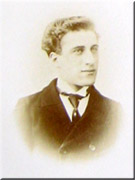|
The Félibrige |
| |
Music: Concerto in C minor for aubois (4th movement – allegro) – Georg Philipp Telemann (1681-1767)
Symphony No. 9 Opus 95 – New World Symphony (extract) – Anton Dvorak (1841-1904)
“In my Parisian exile I had one rainy and bored day discovered Provençal poetry, which no one in Provence, neither in high school, nor in family had ever told me about. Yes, as I was strolling one day in the galleries of the Odéon, I unearthed a 10 centime brochure from the Blériot et Gautier bookstore; this humble booklet composed by the poet Paul Marieton, under its gray cover, contained a few luminous poems by Mistral, Roumanille, Aubanel, and Félix Gras. Suddenly reading them the fog that enveloped me cleared; to the sound rhythm of a language, of which I knew a few words and which I knew instinctively how to pronounce correctly, I had the revelation of a poetic universe, which for me eclipsed that of the Romantics, the Parnassians and the few Symbolists to whom I thought I had to initiate myself. From then on I remembered that my paternal grandfather was an old feliberate, though resigned to the disappearance of the ancient language, which he had never spoken to me about. But I remembered that as a child I looked in his library, rue des Beaux Arts in Marseille, the spine of a book with a strange title that had stuck in my mind, Mirèio, written by hand on a notarial label. I wrote to my grandfather, got me the little Félibrige Treasure recently edited by Father Xavier de Fourvières, and read Mirèio, without spending the sum of 3 francs for its purchase, which is considerable for my schoolchildren’s purse, j ‘was going to shut myself up in the Sainte Geneviève library, where in the smell of wet umbrellas, old books from more or less grimy readers, in the sound of footsteps and turned pages, I inhaled all the perfumes of the Alpilles and I listened to the magnanarelles sing. “ 1901 Emile RIPERT’s first interview with Frédéric MISTRAL (see biography chapter F. Mistral) His involvement in Felibrean circles, his work on Félibrige on the Mistralian doctrine and the Oc language literature are authoritative although there is hardly any illusion about the future of the Provençal language, “We know how degree of wealth has come to the langue d’oïl and what has made it to the political fortunes of the kings who spoke it; we know less about the slow agony and the sudden resurrection of her more modest sister, this poor Cinderella of the langue d’oc, so flourishing during the XIth and XIIth centuries, inspirer then listened to all the European poetry, and celebrated everywhere thanks to her troubadours. “. 1918 he publishes “La Renaissance Provençale” See some extracts Émile Ripert examines all literary movements from the troubadours to the creation of Félibrige. With this work, it was the first time that the world of Provence presented itself as a subject of scholarly research. “I wanted to see in the Provençal Renaissance of the 19th century not a local manifestation…, but a larger and more significant movement, which was linked on the one hand to the movement of nationalities, which stirred up all of 19th century Europe. century, on the other hand to the democratic movement, which has aroused the popular masses since evolution,… Starting from these principles, I studied how the research of scientists and scholars had served to form a conscience Provençal, by resuscitating the forgotten literature of the Troubadours under the pen of a Raynouard, a Rochegude or a Fauriel, how the Romantics’ taste for primitive and popular literature had brought back the patois and the provincial traditions in honor, how their conception of history had shown the considerable part of the southern provinces in the formation of French unity, their individuality, their glory in the time of the Troubadours, their fall after the Crusade c ontre the Albigenses. Thus I showed how this movement of erudition had excited the imagination of the poets of Provence around 1850…. But this poetry of the people could…, find in the South its true form only in Provençal language… .c This is the reason why working-class poetry fell after 1850 and… that from that date poetry in the Provençal language… flourishes definitively and immortally under the pen of Roumanille, Aubanel and Mistral. “. In 1924, Émile RIPERT published LE FÉLIBRIGE. Small volume intended to give an easy-to-read overview of the Felibrean movement and its origins. See an excerpt from the chapter “Font-Ségugne: L’Armana Prouvençau” 1934 The title of FELIBRE MAJOURAU is awarded to Émile RIPERT on May 20, 1934
|




